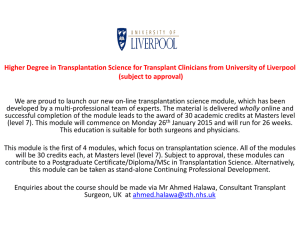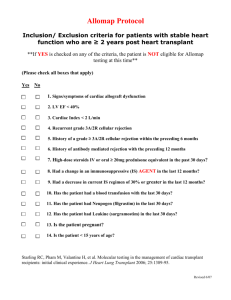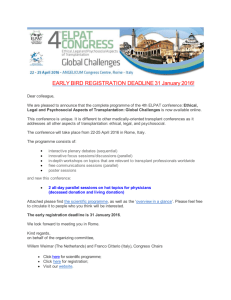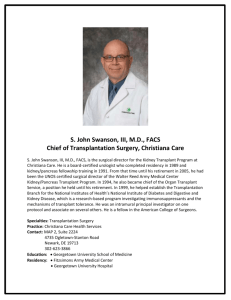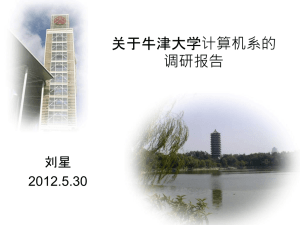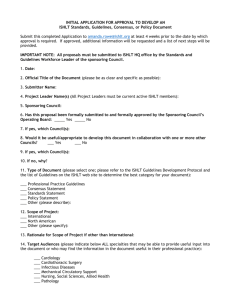Western General Hospital, Crewe Road, Edinburgh EH4 2XU
advertisement
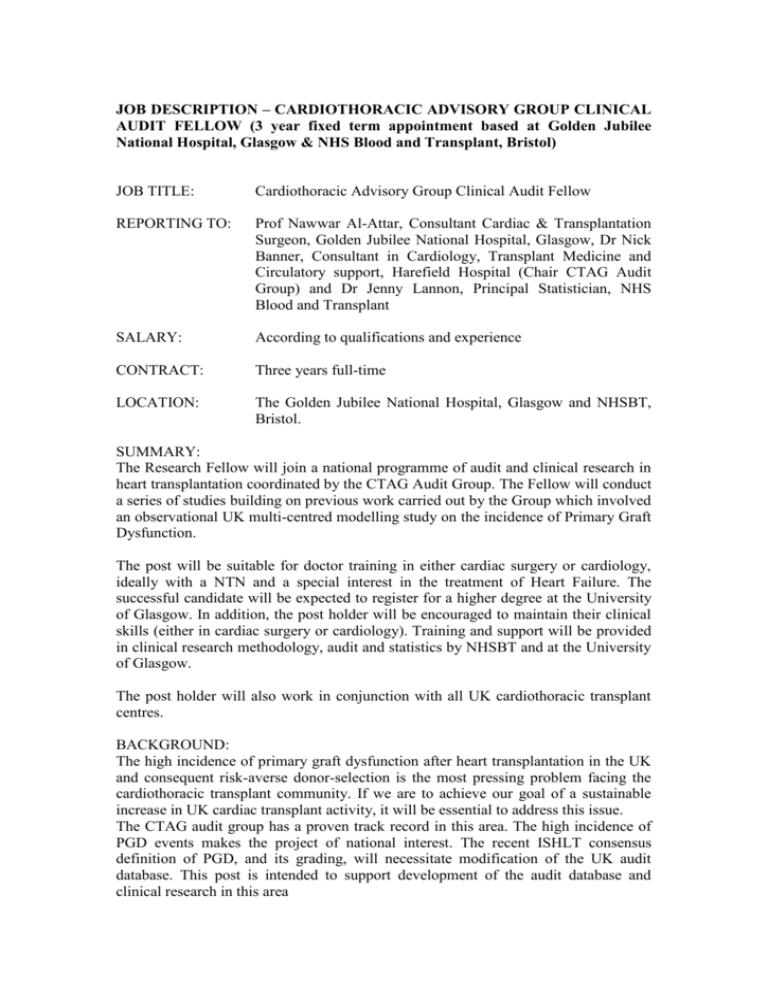
JOB DESCRIPTION – CARDIOTHORACIC ADVISORY GROUP CLINICAL AUDIT FELLOW (3 year fixed term appointment based at Golden Jubilee National Hospital, Glasgow & NHS Blood and Transplant, Bristol) JOB TITLE: Cardiothoracic Advisory Group Clinical Audit Fellow REPORTING TO: Prof Nawwar Al-Attar, Consultant Cardiac & Transplantation Surgeon, Golden Jubilee National Hospital, Glasgow, Dr Nick Banner, Consultant in Cardiology, Transplant Medicine and Circulatory support, Harefield Hospital (Chair CTAG Audit Group) and Dr Jenny Lannon, Principal Statistician, NHS Blood and Transplant SALARY: According to qualifications and experience CONTRACT: Three years full-time LOCATION: The Golden Jubilee National Hospital, Glasgow and NHSBT, Bristol. SUMMARY: The Research Fellow will join a national programme of audit and clinical research in heart transplantation coordinated by the CTAG Audit Group. The Fellow will conduct a series of studies building on previous work carried out by the Group which involved an observational UK multi-centred modelling study on the incidence of Primary Graft Dysfunction. The post will be suitable for doctor training in either cardiac surgery or cardiology, ideally with a NTN and a special interest in the treatment of Heart Failure. The successful candidate will be expected to register for a higher degree at the University of Glasgow. In addition, the post holder will be encouraged to maintain their clinical skills (either in cardiac surgery or cardiology). Training and support will be provided in clinical research methodology, audit and statistics by NHSBT and at the University of Glasgow. The post holder will also work in conjunction with all UK cardiothoracic transplant centres. BACKGROUND: The high incidence of primary graft dysfunction after heart transplantation in the UK and consequent risk-averse donor-selection is the most pressing problem facing the cardiothoracic transplant community. If we are to achieve our goal of a sustainable increase in UK cardiac transplant activity, it will be essential to address this issue. The CTAG audit group has a proven track record in this area. The high incidence of PGD events makes the project of national interest. The recent ISHLT consensus definition of PGD, and its grading, will necessitate modification of the UK audit database. This post is intended to support development of the audit database and clinical research in this area 16th June 2014 MAIN TASKS FOR THE CLINICAL RESEARCH FELLOW: The main aims for the Research Fellow will cover areas of literature review, auditing and practice change, and research developments around management of primary organ dysfunction. These will provide the Research Fellow with a comprehensive exposure to and understanding of clinical research The audit fellow will be involved in four streams of work which will form a coherent basis for a research thesis and are likely to result in several peer review publications. Stream One: Modelling the incidence of PGF Work to-date has been carried out looking at the univariate impact of individual risk factors on the incidence of PGF. The fellow will extend this work and construct a multivariate model which takes in to account the combined effects of these factors and looking in more detail at the grading of PGD and its impact on clinical outcome. Stream Two: Impact of the implementation of new ISHLT guidelines for defining cardiac PGD The research fellow would be involved in retrospective data collection and validation from individual centres. Data would be collected in order to grade PGD as defined by ISHLT. This will allow us to compare the ISHLT definition to previous definitions and explore the relationship of this new definition to clinical events. Stream Three: Supporting the development of heart and lung allocation protocols The CTAG Zonal Allocation Working Group has recently been established to review the existing zonal arrangements for heart and lung allocation zones which are currently shared between the two organs, and to define new arrangements as necessary. The research fellow would support the Group in the development of heart and lung allocation protocols in general, including support for computer intensive simulation studies, for example. The fellow would help inform multivariate modelling of outcomes and waiting times. Stream Four: Pilot Clinical Trial on the use of remote preconditioning in cardiac donors This is a national study which aims to determine whether remote ischaemic preconditioning (RIC) reduces PGD after heart transplantation and improves heart transplant outcome. The fellow would directly contribute to setting up the design of the trial, initiate a pilot study (in Glasgow) to establish feasibility of the technique in donors. This entitles working with an industry partner who provides devices that would blind operator to intervention making the trial a randomised double blinded placebo-controlled trial. References Botker, H. E., Kharbanda, R. K., Schmidt, M. R., Bottcher, M, Kaltoft, AK, Terkelsen, CJ, Munk, K, Anderson, NH, Hansen, TM, Trautner, S, Lassen, JF, Christiansen EH, Krusell, LR, Kristensen, SD, Thuesen, L, Nielsen, SS, Rehling, M, Sorensen, HF, Redington, AN, and Nielsen, TT. Prehospital remote ischaemic 16th June 2014 conditioning increases myocardial salvage in acute myocardial infarction. Lancet . 2010. Thielmann M, Kottenberg E, Kleinbongard P, et al. Cardioprotective and prognostic effects of remote ischemic preconditioning in patients undergoing coronary artery bypass surgery: a single-center randomized, double-blind, controlled trial. Lancet 2013; 382: 597-604. Ericca.lshtm.ac.uk protocol accessed 24 August 2013. Rogers, C. Primary Graft Dysfunction – updated analysis. Oral presentation to the NHSBT CTAG Heart Advisory Group. 18/09/2013. Banner N R, Thomas, H.L, Curnow, E, Hussey, J C, Rogers, CA., Bonser, RS. The importance of cold and warm ischemia for survival after heart transplantation. Transplantation 2008;86: 542-547 Kobashigawa, J, Zuckermann A, Macdonald, P, Leprince, P, Esmailian, F, Luu, M, Mancini, D, Patel, J, Razi, R, , Reichenspurner, H, Russell, S, Segovia, J, Smedira, N, Stehlik, J, Wagner, F. Report from a Consensus Conference on Primary Graft Dysfunction After Cardiac Transplantation. Downloaded from ISHLT website. APPROPRIATE SKILLS: The successful candidate will have a postgraduate qualification in medicine. Preferably a cardiothoracic surgical or heart failure cardiology trainee who is highly numerate with strong statistical and programming knowledge. An interest in clinical research, inter-personal skills and an ability to work within a team are essential. PLACES OF EMPLOYMENT Golden Jubilee National Hospital, Agamemnon Street, Clydebank, G81 4DY, UK NHS Blood and Transplant, Oak House, Reeds Crescent, Watford, WD24 4QN CONTRACT A three year fixed contract will be offered. APPLICATION Application is by NHS Application Form including current CV which should be submitted with a statement of support indicating the applicant’s interest in clinical research. Short-listed candidates will be invited for interview. Informal enquiries about the post are encouraged and should be directed to Prof Nawwar Al-Attar (Nawwar.Alattar@gjnh.scot.nhs.uk; Tel 0141 951 5853) Dr Nicholas Banner (n.banner@rbht.nhs.uk; 01895828556). 16th June 2014 EMPLOYEE SPECIFICATION REQUIREMENT ESSENTIAL DESIRABLE Qualifications Hold MB, ChB or equivalent Postgraduate qualification e.g. MRCS or MRCP Clinical Experience Experience of cardiac surgery or cardiology Clinical Audit experience Interest in management of heart failure or organ transplantation Clinical trial and/or other research experience Presentations at external clinical or research meetings Publications in peerreviewed journals Management and Administrative Experience Teaching Experience Research Experience Ability to work within and , when appropriate, lead a multi-disciplinary team Understanding of and ability to institute clinical governance measures Ability to teach junior medical and nursing staff Other Attributes Ability to communicate effectively and work with/influence senior colleagues across a range of specialities. Ability to write reports and papers in the medium of English Good interpersonal skills Commitment to Continuing Medical Education and the requirements of Clinical Governance and Audit Willingness to undertake additional professional responsibilities at local, regional or national levels Highly numerate with strong statistical knowledge (including use of statistical software) Long-term commitment to transplantation’
